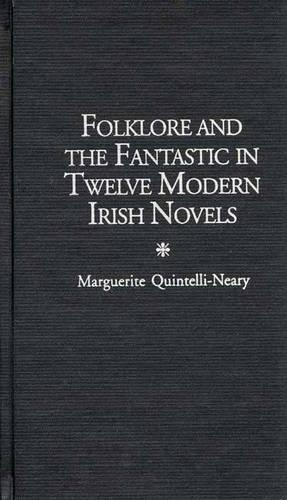
Folklore and the Fantastic in Twelve Modern Irish Novels
(Hardback)
Publishing Details
Folklore and the Fantastic in Twelve Modern Irish Novels
By (Author) Marguerite Quintelli-Neary
Bloomsbury Publishing PLC
Praeger Publishers Inc
9th December 1997
United States
Classifications
Tertiary Education
Non Fiction
Literary studies: c 1900 to c 2000
Folklore studies / Study of myth
823.9120915
Physical Properties
Hardback
176
Description
Ireland has a rich mythological tradition that stretches back for centuries, and much of this folklore tells tales of the fantastic. During the Irish Renaissance, authors such as William Butler Yeats and Lady Gregory resurrected Irish folklore in their literary and dramatic works, thus restoring the popularity of Irish myth and legend. Since the Irish Renaissance, many Irish authors have continued to incorporate Celtic folklore in their novels. This book examines how various conventions from Irish folklore have been subsumed in 12 Irish novels published between 1912 and 1948, including works by James Joyce, Flann O'Brien, Mervyn Wall, Darrell Figgis, Eimar O'Duffy and James Stephens. The volume explores how these writers have incorporated in their own works such conventions as heroic obligations, metamorphoses, and the blending of pagan and Christian myths. In an episodic overview of Joyce's "Ulysses", specific Irish source works are discussed, including the Irish imram or sea voyage, and the bruidhean adventure, or entrapment episode. The conventions of geis, metamorphosis and the Ossianic tradition are studied in "Finnegan's Wake", alongside a traditional Irish ballad, "The Annals of the Four masters", and the "Acallamh na Senorach". In Flann O'Brien's "At Swim-Two-Birds" and "The Third Policeman", an innovative approach to parody is shown. Mervyn Wall operates as a sometimes unwitting commentator on Irish hero tales, via comic irony and inverted motifs, while Darrell Figgis recalls the passing of Celtic heroic traditions in his bitter satire of Saint Patrick and Oisin's legendary dispute, in "The Return of the Hero". Eimar O'Duffy's satire of modern Ireland mourns the end of Celtic heroic values in a fantasy that is overwhelmingly pessimistic in tone, while James Stephens extols the virtues of the imagination in "The Crock of Gold" and "The Demi-Gods".
Author Bio
MARGUERITE QUINTELLI-NEARY is Director of the English Education program at Winthrop University, South Carolina, where she also teaches literature and composition. She is an active member of the National Council of Teachers of English and the American Conference for Irish Studies and has presented papers and published in the areas of pedagogy, literature, and folklore.
